

























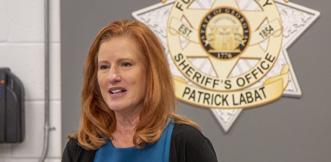

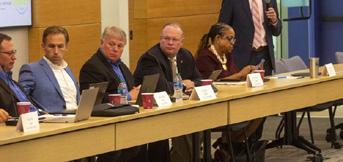






























CUMMING, Ga. — Lots of applause, or what gala host Cadillac Jack called “hoo tin’ and hollerin,’” reverberated through the Forsyth Conference Center Oct. 27, where more than 300 award-winners walked down the red carpet to claim “Best of North Atlanta,” chosen by the public and recognized by Appen Media.
The gala touts Appen Media’s annual contest, which spans five categories in Food & Beverage, Medical, People and Community, Recreation and Services. The North Atlanta community had a onemonth window for nominations and an other month for voting. Eligible businesses were those located in Alpharetta, Forsyth County, Johns Creek, Milton and Roswell — all Appen Media news coverage areas.
“Each year, I continue to be impressed by the public response to our call to ac tion to honor local businesses,” Appen Media Publisher Hans Appen said.
For the first time in its 15-year his tory, the contest surpassed 100,000 votes, which Appen said is a testament to readers’ appreciation and support for the area’s business community.

“This year’s award winners should be particularly proud to be recognized in the most competitive contest we’ve put on yet,” Appen said.
Following a two-year gap, the gala returned bigger and better than ever in a new space. With more than 400 guests, the event featured live music from Rae and the Royal Peacocks, dinner and des sert from A&S Culinary Concepts and Nothing Bundt Cakes and spirits from Mraz Audiology and Six Bridges Brewing.
There was also a photo booth, where guests could choose an array of props — including but not limited to, lobster claw rubber gloves.

During cocktail hour, several awardwinners shared their story and gratitude for recognition.
Kadijah Vickers earned Best New Business for her restaurant and bar, The Vick, which opened on Canton Street in Roswell August 2021. Vickers said she wasn’t aware that she won the award until one of her patrons came with two copies of the newspaper.
“I took the paper the next day and got it framed because I appreciate know ing that somebody saw the hard work that I had put in,” she said. “Because at times, you don’t think anyone sees it.”
Vickers moved from Florida about 10 years ago to pursue her culinary degree from Le Cordon Bleu. After running a few restaurants, she began her own catering business during the pandemic and sought commercial kitchen space to
AMBER PERRY/APPEN MEDIA Kadijah Vickers, owner of The Vick and Best New Business award recipient, stands with Crystina Kennedy, The Vick’s events and social media director.

continue independent work.
While being a single business owner has its obstacles, Vickers said it’s reward ing to pursue her dream and passion.
“I know that I’m aligned with what I’m supposed to be doing,” she said.
While many in the Alpharetta Sym phony Orchestra were busy with rehears al elsewhere, Board President Susan Hanna attended the gala on behalf of the nonprofit, which earned First Runner Up for Best Performing Arts/Theater.
“All of our efforts are finally paying off,” Hanna said.
Because of the pandemic, the organi zation went to extra lengths.
“We found a space that was big enough for us to social distance, re hearse and record,” she said. “We were able to march through the pandemic … There’s so much work that goes on behind the scenes.”
Hanna talked about Alpharetta Sym phony Orchestra events, which foster inclusivity. For example, the Chamber Or chestra hosted a sensory-friendly concert for children with disabilities last year.
She recalled talking to a friend, who has a son with disabilities. Hanna said she often invites them to the orchestra’s events, and one day, asked her friend why attending is so important.
“Her son, although he may not be ter ribly communicative, is very connected to the music,” Hanna said. “I feel like music is a language that kind of ties us all.”
To see the full list of winners, go to bestofnorthatlanta.com.

Rich McCormick
Christian
As a helicopter pilot in the United States Marines and an emergency room doctor during the COVID-19 pandemic, I’ve committed my entire adult life to serving my country

community. Representing the 6th District in the United States Congress is an extension of my lifelong commitment to public service. America, now more than ever, needs a doctor in Washington who can re-ignite our economy, revive our freedoms, and empower the people –not the federal government.

CHRISTIAN: As a father, a hus band, a small-business owner, a non profit founder, and a combat veteran I have directly experienced the day-to-day struggles that affect most people in their lives. I know what it is like to live pay check to paycheck, I know the hardship of no insurance, and I understand the tough choices that impact families in our communities. I feel that this background equips me to better grasp the impact of policy on the normal, everyday American
that makes up the bulk of our country.
In a project titled Georgia Decides, Atlanta Civic Circle and The Atlanta Journal-Constitution teamed up to provide voters with a side-by-side look at the candidates for office, their views on issues voters care about most, their party affiliation, and their history in elective politics. It is a non-parti san compilation of information, including responses to a candidate ques tionnaire, to ensure voters are informed before they cast their ballots.
McCORMICK: For two years, Democrats in Washington D.C. tried to prove that more government and more spending would solve Ameri ca’s problem. Today, Americans are pay ing the price for ex cessive government involvement with staggering inflation and a recession. When you find yourself in a hole, the first thing you do is stop digging. America is at its best when govern ment is limited. I will unapologetically work to empower small businesses and
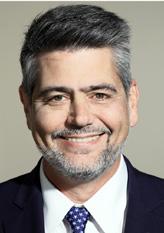
Through a partnership with Atlanta Civic Circle, Appen Media is republish ing the questionnaire portion of Georgia Decides after editing for grammar.

To view the full Georgia Decides election guide, please visit atlantacivic circle.org or ajc.com.
hardworking citizens by cutting regula tions and reducing the size, scope, and spending habits of the federal govern ment.
CHRISTIAN: The role of government in the lives of Georgians, and all Ameri cans, should be to make our lives easier. Whether that is by providing assistance to successfully build a small-business, pursue a higher education, or just making sure that there is dinner on the table, helping people should be the top priority of our government.
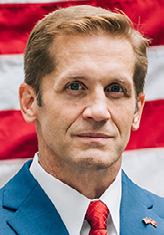
If you are elected (or re-elected), what problems will you spend the most time solving and why?
McCORMICK: Inflation is the num ber one problem facing Americans. Sky high inflation is the direct result of a Democrat controlled Congress and White House that printed too much money. Americans are struggling to afford gro ceries and gas, and the economy is in a
recession because of Democrats reck less spending. We must reduce waste ful government spending that is driving inflation and institute deregulatory and pro-growth tax policies. Together these initiatives will increase take real wages and bring stability to our economy.
CHRISTIAN: Currently, the larg est problems facing our nation are the threats to women’s rights and the threat to voting rights. I will work tirelessly to ensure that Roe V. Wade becomes the law of the land so that women have the fundamental rights of self-autonomy and choice. I will also advocate for and support the passage of the John R. Lewis Voting Rights Act to ensure that the basic right of all Americans to vote is preserved for now and for future genera tions.
Georgia is a politically diverse state. How will you work to represent
What role should government have in the lives of Georgians? How would you apply that philosophy to the job you are seeking?
McCORMICK: I went to Morehouse School of Medicine for my medical degree. Morehouse is an HBCU that is predominately Black, liberal, and female. It is not a place you’d expect a White conservative male to be elected student body president. But I was. I was elected student body president at Morehouse and selected to give the commencement address because I believe in the power of relationships, and I treat people with dignity and respect even if they disagree with me. I think those values will go a long way in representing all of Georgia’s 6th district in Congress, not just those that decide to vote for me.
CHRISTIAN: In the course of my campaign for Congress, I have served as a panel member on a Tea-Party forum, been the guest on a right-leaning talkshow, and spoken in front of progressive Democrats. My district encompasses all or parts of six counties and covers 765,000+ plus people. I know that I will not agree with them all, but it is my job to listen, learn, and do the best I can to bring everyone of those voices to Wash ington D.C.
Who has been the biggest influence on how you view state government and politics? What have you learned from this person?
McCORMICK: Ronald Reagan had the famous quote, “The nine most terri fying words in the English Language are: I’m from the government, and I’m here to help.” I think that appropriately sums up our current economic situation. We are in a recession with sky high inflation because Democrats and the current administra tion believed more government and more spending could fix America’s problems.
It is the 1970s all over again – the beards, long hair, opioid overdoses, run away energy costs, proxy war with Russia, hatred of the military, hatred of the police. But I’m optimistic – just like Ronald Rea gan was – that our best days are still ahead of us if we get government out of the way America’s exceptionalism will truly shine.
CHRISTIAN: The biggest influence in almost every aspect of my life has been my parents. I am fortunate enough to have had two incredible people raise me, mold me, and guide me to the point I am today. My mother, whom I lost to Covid in 2020, taught me compas sion and faith are often the best places to start when facing any problem. My father taught, and is still teaching me, that being right and being fair are not necessarily the same thing.
Georgia has a lot to offer cur-
rent and potential residents, but many parts of the state are becoming increasingly unaffordable. Please explain your proposed approach to address housing affordability through federal legislation and executive actions?
McCORMICK: America doesn’t need more government to fix the affordability crisis, it needs government to get out of the way. Georgia, like the rest of America, is becoming unaffordable because of the im pact of inflation and an unreliable supply chain that is driving up the cost of goods.
America must end its dependency on China for manufacturing by enhancing America’s competitiveness and reestab lish a stable supply of domestic energy so good paying manufacturing jobs can return to the United States.
CHRISTIAN: There are numerous programs already available to expand access to affordable housing, not only in Georgia, but across the country. Whether that is through mortgage as sistance via Fannie Mae or Freddie Mac, or service-related assistance such as the VA housing loan available to veterans (the path I took), or through the direct assistance programs open to low-income citizens. Unfortunately, over the last decade we have seen these programs are poorly managed, poorly funded, and poorly executed.

The first step must be a compre hensive, bi-partisan review of all of our

current solutions to determine what is working (and why), and what is failing (and why). From there we can begin the process of building programs that ef fectively meet the current needs of our communities.
Politics is often about compromise. How do you decide when to compromise and take small, incremental wins, and when to refuse compromise?
McCORMICK: I am elected by the voters to represent the 6th district of Georgia, not a political party or a particu lar individual. Ensuring the best out comes for the constituents of the 6th Dis trict will require working with colleagues from all walks of life. As I work for real results, I will not compromise on my core values of limited government because as government expands, liberty contracts.
CHRISTIAN: The art of governance is the art of compromise. We used to be very good at disagreeing with each other, but still solving problems. Even if we only took tiny steps we have a long his tory of moving forward. For me, person ally, the decision to compromise weighs entirely on the benefit to those I hope to represent. My job is to make their lives better, and my approach to any problem will always begin with that thought at the forefront of my mind.
next
Continued from Page 5
There were politicians who questioned the outcomes of Georgia elections in 2018 and 2020. Do you think Georgia’s elections are secure and will you stand by the results?
McCORMICK: Previous elections have shown that the Georgia General As sembly’s 2021 election integrity overhaul have made it easy to vote and hard to cheat in Georgia elections. I am confi dent this law will prove its effectiveness again in 2022.
CHRISTIAN: There is not a shred of evidence to support the idea that our elections are anything but accurate and secure. Three different hand recounts of the ballots in Georgia proved beyond a doubt that we got it right. I firmly believe in the election process and will stand by the results as determined by the voters.
In light of the U.S. Supreme Court’s decision on abortion, state law and local enforcement authority will determine access to abortion. If elected, how will you use your author ity in the U.S. House to influence abortion access or enforcement of abortion restrictions?
McCORMICK: The Dobbs decision ruled Roe v. Wade as unconstitutional
and restored power back to the states where it rightfully belongs. I do believe that Congress has a duty to make it safe to give birth and easy to adopt. We are morally obligated to stand up for what’s right and protect the innocent unborn from late term abortion in which a life is ended a breath away from a birth certificate.
CHRISTIAN: If elected I will im mediately sponsor legislation and/or co-sponsor existing legislation to ensure that that Roe V. Wade becomes the law of the land.

The U.S. Congress often votes along party lines. When would you seek bipartisan action and what is sues merit such consensus?
McCORMICK: Much of the work Congress does should be bipartisan. In deed, Congress passes many bills under suspension of the rules with near unani mous support. Issues such supporting our military, funding for infrastructure, and ensuring America’s national security should bring both sides together.
CHRISTIAN: As the old saying goes, it takes two to tango. Rarely, if ever, have any of the problems facing the na tion been solved by a one-sided argu ment. Trying to listen to and understand another point of view is the fundamental role of a representative and it is my goal to live by that ideal every day of my term.
Josh McKay did not respond to the survey.
On his campaign website, he says Georgia’s “heartbeat bill” — now Georgia law — strikes a good balance by protect ing life, mothers and doctors. He wants the pro-life values to extend to pregnant moms with prenatal care and to children in foster and adoptive care. On the role of government, he says government should get out of the way and let the private sector and the free market solve the problems — with government intervention reserved as the last resort.
How does your background equip you for the job you are seeking?
ISLAM: I am the daughter of work ing-class immigrants, raised right here in Gwinnett. My father was a file clerk and my mother worked in a ware house. When she hurt her back, the insurance company tried to deny her the benefits she had a right to. I know firsthand how broken our healthcare system is.
My parents chose to raise me in Gwinnett because of the public schools. Gwinnett’s schools gave me opportuni ties my parents never had.
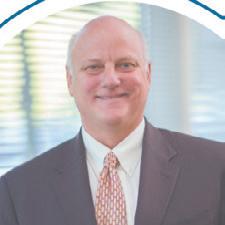
As an organizer, I have fought to pro tect our voting rights and fight against efforts that disproportionately disenfran chise Black and brown voters.
I am running because of the urgency of this moment in which we have to protect our voting rights, fully fund our schools, reverse the extreme GOP abor tion ban, and expand healthcare.
What role should government have in the lives of Georgians? How would
ISLAM: At minimum, the government should not make people’s lives harder. State government can improve people’s lives with tan gible results – like lowering health care costs, investing in good jobs, raising wages, fully funding our schools. The government also has a responsibility to keep our communities safe. That’s why I’ll work to make sure that law enforce ment has the resources they need, and also why I’ll combat the gun violence epi demic. Finally, the government should be protecting, not restricting people’s rights. We need to make sure that wom en can make their own decisions about abortion and healthcare, and that all Georgians are free from discrimination.
If you are elected (or re-elected), what problems will you spend the most time solving and why?
ISLAM:
– We need to expand healthcare access; I will work with my colleagues to expand Medicaid.
– We need to fully fund our public schools.
– We need to protect the right to vote. I will work to expand access to the ballot and block racist bills that further disen franchise Black and brown people.
– We need to combat crime and gun
Thursday, November 10, 2022 • 8–9:30am

Located at Phase Events. • 12150 Morris Rd. #7 • Alpharetta, GA 30005
Open to the community. Register at www.alpharettachamber.com or pay at door. Light breakfast provided by Grouchy’s NY Deli.
Engage to Excel
404.545.0212
www.alpharettachamber.com deborah@alpharettachamber.com




violence. I will work to overturn Kemp’s “criminal carry” law.
– We need to restore abortion rights and overturn the draconian six-week ban.
– We need to raise wages and invest in jobs.
Georgia is a politically diverse state. How will you work to represent Georgians whose political views differ from your own?
ISLAM: I will be a state senator for not only the people in District 7 but for all the Georgians who have traditionally not had their voices heard. My office will be available to my constituents to raise concerns and hold me accountable. I will ensure that I schedule town halls for constituents to hear my agenda and pri orities during the term – and for me to hear their concerns. I will keep a robust public schedule and remain an active member of the community. I will never turn away a constituent who needs help.
Who has been the biggest influ ence on how you view state government and politics? What have you learned from this person?
ISLAM: Republicans in Gwinnett County have been one the biggest influ
ences on how I view politics. Growing up here, I recognized that instead of seeing our diversity in Gwinnett as an oppor tunity, Republicans saw us as a chal lenge, which taught me that if we ever wanted to have a seat at table, we had to demand it. I learned that when you are not at the table, you are on the menu which is why I got involved in helping my community.
Georgia has a lot to offer current and potential residents, but many parts of the state are becoming increasingly unaffordable. Please explain your proposed approach to address housing affordability through legislation and executive actions?
ISLAM: Gwinnett needs more af fordable housing. Full stop. One-third of our county’s population cannot afford to purchase a home – not just low-income folks, but middle-income people working in critical jobs like our teachers, fire fighters, police officers, librarians, and county employees. Rent continues to rise but wages stay the same. People are being priced out because of a housing shortage from new single-family homes to new apartments, especially as we come out of the COVID-19 pandemic. I am committed to enacting policies that ensure everyone can have access to homeownership. I will work to create more housing, lower costs, and higher wages.
Politics is often about compromise. How do you decide when to compromise and take small, incre mental wins, and when to refuse compromise?
ISLAM: Compromise is often neces sary when it comes to moving the ball forward and improving our communities. Acceptable but painful compromises may include “How much can we lower costs? How much can we raise wages? How many more people can we expand Medicaid to? How big can this hous ing or transportation project be?” I will never allow the perfect to be the enemy of the good, but I will never stop fight ing for the best possible outcome we can achieve for my constituents. And it is never acceptable to compromise when it comes to fundamental values, protecting lives, and human rights. Therefore, I will never waver in my convictions when it comes to reversing abortion restrictions, getting guns off our streets or ensuring the right to vote.
There were politicians who ques tioned the outcomes of Georgia elections in 2018 and 2020. Do you think Georgia’s elections are secure and will you stand by the results?
ISLAM: Absolutely, yes. And election deniers have no place in public office.
In light of the U.S. Supreme
Court’s decision on abortion, state law and local enforcement authority will determine access to abortion. If elected, how will you use your author ity in the state Senate to influence abortion access or enforcement of abortion restrictions?
ISLAM: The unthinkable happened when the extremist Trump-McConnell Supreme Court overturned Roe v. Wade. As a result, Georgia’s extreme six-week abortion ban went into effect. Six weeks is only two weeks after a missed period – before most women even know they’re pregnant! My opponent celebrated when Roe was overturned and supports the six-week ban. The right to birth control is also under attack. We absolutely must fight back against these Republican attacks on our rights. When I’m in the legislature, I’ll never back down from protecting the right to an abortion – and I’ll sponsor legislation to overturn the Republican abortion ban and enshrine the right to birth control into law.
As state senator, I will defend the right to an abortion, protect birth con trol, fully fund women’s healthcare, and fight to overturn the extreme Republican six-week abortion ban.
Are there any programs/legislation you’ve sponsored or created to help people with disabilities?
ISLAM: When I am elected, I will
on next page
Fall brings falling leaves and rising rates! Open a new ACB Money Market Account and earn

If our posted rates rise, we may increase your rate but the APY won’t fall below 2.48% during the promotional period.
Johns Creek 470.422.1200


sponsor legislation that prioritizes the needs of our disability community such as expanding Medicaid which would cover low income disabled Georgians and will work to fully fund our Home and Commu nity Based Services waitlist so that Geor gians with disabilities do not have to wait years to obtain they care they deserve.
Georgia closed out its budget year with a “likely record surplus, billions of dollars in federal aid and a grow ing economy.” Georgia spends more than half of this money on education and health care. What would you want to see in the budget in terms of spending or taxes?
ISLAM: I grew up in a working-class family, and I watched my parents work hard to make ends meet. I understand the importance of making sure the economy works for everybody – not just millionaires and corporations. I will always fight for higher wages, more jobs, and lower prices for Georgia families. That includes raising
the minimum wage and getting hous ing prices under control. We also need to make sure that millionaires, billionaires, and greedy corporations are paying their fair share of taxes – so that we can reduce the burden on everyone else. It’s not right when a CEO is paying less in taxes than his receptionist – or when teachers and firefighters have to pay more in taxes than private equity managers. As for spend ing, we should be fully funding our public schools, expanding Medicaid, and invest ing in transportation and infrastructure, like expanding MARTA into Gwinnett.
The Legislature often votes along party lines. When would you seek bi partisan action and what issues merit such consensus?
ISLAM: Current day politics have become far too polarized. We have more in common than what divides us. I be lieve there is a path where we recognize each other’s humanity and put the lives of people over bickering politics. I will always seek consensus when it is pos sible and I will work with my Republican colleagues to pass life-saving legislation like expanding Medicaid to 500,000 Georgians.
Seat: Georgia State Senate, District 48
Republican: Shawn Still Democrat: Josh Uddin
Shawn Still did not reply to an emailed questionnaire. On his website, Still says he will sponsor local legislation to raise the homestead exemption, will cut state spending and fund police.
How does your background equip you for the job you are seeking?
UDDIN: I am running to be the next state senator for District 48 in South Forsyth, North Gwinnett, and North Fulton County to deliver leadership that puts our families first. I have worked in the insurance industry and run a suc cessful insurance business that helps small businesses and entrepreneurs successfully operate their businesses. Over the years, I have seen the im portance of having pro-business and pro-job growth policies and a favorable tax and regulatory structure to help our
economy prosper and empower job creators.
As a parent to Fulton County Public School students, one of whom recently graduated and attends Georgia State University, I have experience navigating our local school and university sys tems and recognize that our state can do more to help parents and students thrive. I have also been civically active in my community, volunteering at my local food bank, working with organiza tions like the local Rotary club that help improve our quality of life.

As a Bangladeshi-American, I would offer a diverse voice in the State Senate,
next
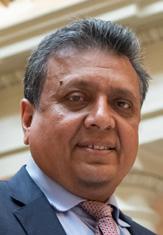
and will apply my skillset in business to wards addressing many of the economic and quality of life challenges that our state is facing.
What role should government have in the lives of Georgians? How would you apply that philosophy to the job you are seeking?
UDDIN: America has always repre sented a place of freedom and opportu nity, and I want to preserve those values in our state and our nation. I will always work to prevent excessive government interference or intrusion in the lives of Georgians. I will focus on policies that promote freedom and make life better for the people of District 48.
If you are elected (or re-elected), what problems will you spend the most time solving and why?
UDDIN: I will work to protect women’s rights and reproductive choice, preserve our Democracy, lower income and property taxes, address the rising costs of healthcare and prescription drugs, support law enforcement and re duce crime, protect local control so that our cities and counties have the freedom to represent their constituents, empower parents and students and strengthen our public schools, and work to create a pro-business and pro-jobs policies in Georgia that help us unleash our eco nomic potential as a state.
Georgia is a politically diverse state. How will you work to represent Georgians whose political views differ from your own?
UDDIN: As a business owner and a longtime resident of Johns Creek, I have regularly interacted with community members with a wide variety of political views. District 48 is a politically bal anced district and I believe it is impor tant that the State Senator from this district considers political viewpoints and input from both sides of the aisle. I will regularly hold town hall meetings and provide other means of accessibility such as my telephone number and my website to ensure that constituents can give input as I consider legislation and public policy. I will focus on solutions, rather than furthering political divisions and gridlock that holds our state back.
Who has been the biggest influence on how you view state government and politics? What have you learned from this person?
UDDIN: I am grateful to have work ing relationships with a number of cur rent and former state legislators includ ing Sen. Michelle Au, Rep. Angelika Kausche, and former State Sen. Curt
Thompson. Working with and discuss ing the work of the Legislature with these local leaders has given me impor tant feedback and information about what it takes to be an effective member of the Georgia Legislature. Likewise, I have learned from local leaders like City Councilman Alvin Hicks of Sugar Hill and Congresswoman Carolyn Bourdeaux about the needs of communities in my district and how to be a good public servant.
Georgia has a lot to offer current and potential residents, but many parts of the state are becom ing increasingly unaffordable. Please explain your proposed approach to address housing affordability through legislation and executive actions?

UDDIN: I want to work with local and state leaders toward finding marketbased solutions to our housing afford ability challenges. I support increasing the homestead exemption to lower prop erty taxes, because high property taxes make it harder for homeowners to stay in their homes or for prospective home owners to purchase a home. I would like to work with the private sector to propose incentives that will increase the construction of market-based housing that fits the needs of our workforce, in cluding teachers, and police officers, our seniors, and young families.
Politics is often about compromise. How do you decide when to compromise and take small, incremental wins, and when to refuse compromise?
UDDIN: I believe on most issues we can find common ground and areas of agreement to create good policy for the people of Georgia. In the State Senate I will always work toward delivering wins and results that help the people of Dis trict 48. I will only refuse to compromise when it comes to protecting the people of our state and our rights.
There were politicians who questioned the outcomes of Georgia elections in 2018 and 2020. Do you think Georgia’s elections are secure and will you stand by the results?
UDDIN: Unlike my opponent, who served as a “fake elector” for Donald Trump and promoted the “big lie” about voter fraud in the 2020 election, I sup port and believe in our democracy. I be lieve Georgia’s elections are secure, and that the results of the 2018 and 2020 elections were accurate. I will stand by the results of the 2022 election as well and believe protecting our democracy is more important than supporting a politi cal party or candidate. Denying election results and spreading conspiracy theo ries about our election has led to a crisis that imperils the future of our nation.
In light of the U.S. Supreme
Court’s decision on abortion, state law and local enforcement authority will determine access to abortion. If elected, how will you use your author ity in the state Senate to influence abortion access or enforcement of abortion restrictions?
UDDIN: I am against the overturning of Roe v. Wade and believe Republicans’ passage of a ban on abortion in Georgia puts the health and lives of women at risk, including my wife and daughters. I believe that women deserve the freedom to make their own healthcare decisions, and that it is not the role of government to interfere in deeply personal matters. I will support legislation that protects reproductive freedom and choice for women.
Are there any programs/legislation you’ve sponsored or created to help people with disabilities?
UDDIN: In my first term I would support and sponsor legislation that makes it easier for people with disabili ties to find employment that pays good wages, and improve services and sup port for people with disabilities and their families. Too many people with disabili ties and their families are facing barriers towards accessing care and services, whether in our healthcare system or our schools. I would work with leaders in the disability community towards good public policy on this issue.
Georgia closed out its budget year with a “likely record surplus, billions of dollars in federal aid and a grow ing economy.” Georgia spends more than half of this money on educa tion and health care. What would you want to see in the budget in terms of spending or taxes?
UDDIN: I believe in fiscal responsi bility and a balanced budget. We have an opportunity to return the state sur plus into the pockets of taxpayers, and I am supportive of meaningful tax relief at this time of high inflation and increases in the cost of living. I would support ad ditional funding to raise the pay of law enforcement officers and address crime, and to raise teacher pay, because cur rently the state of Georgia does not pay teachers in a manner that shows respect for the important work they do.
The Legislature often votes along party lines. When would you seek bipartisan action and what issues merit such consensus?
UDDIN: I will always work to deliver bipartisan action that improves our quality of life. Issues like delivering tax relief, infrastructure investments, reduc ing crime, improving education, and healthcare can all be resolved in a bi partisan manner if we have leaders who are willing to focus on doing good for the people of Georgia rather than scoring political points.
CHARTER MEMBER
Robin Fricton
Roderick Liptrot
Tom McMurrain
Bob Meyers
Kim Truett
Roger Wise Jr.
MEMBER+
Rita Brown
Mark Casas
Charlcie Forehand
Anne Peer
Robert Popp
Mark Rundle
Suraj Sehgal
MEMBER
Barbara Anderson
Mary Asbury
Alpharetta Lions Club
Barbara Bauschka
Leslie Berry
Tom Billings
Joe Bowen
Clea Calloway
Kirk Canaday
James Carr
William Cartwright
Pat Check
Rebecca Donlan
Tom Driscoll
Danny Elkins
Martha Fasse
Amy Frederick Carol Fry
Christopher Goodrich

Joe Hirsch
Penn Hodge
Tyler Jones
Mark Kelly
Allison Kloster
Ken Leffingwell
Karen Magill
Al Merrill
Fred Moeller
Righteous PR
Stephanie Schuette
Cindy Simpson
Faye Sklar
Andy Smith
Lisa Tilt
Ollie Wagner
Lewis Walker
Republican: Todd Jones (I) Democrat: Craig J. Meyer
Todd Jones did not respond to the questionnaire.
Jones is vying for re-election to the State House, where he’s served since January 2016, representing constitu ents in south and north Fulton Counties. Jones is chairman of the House Appro priations’ Subcommittee on Education and a member of the Budget & Fiscal Affairs Oversight Committee. Jones has come out in favor of term limits at the state and national levels and has pledged to personally serve no more than eight years in the House. On his campaign website, he says he will fight to reduce the income tax to zero and replace it with the Fair Tax. He also supports legislation requiring that voters approve in advance any tax increase at the local level.
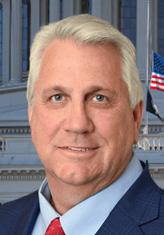
How does your background equip you for the job you are seeking?
MEYER: My background: U.S. Army – 82nd Airborne Division; Bachelor of Science in political science, Arizona State University.
What role should government have in the lives of Georgians? How would you apply that philosophy to the job you are seeking?
MEYER: The government needs to support the people.
If you are elected (or re-elected), what problems will you spend the most time solving and why?
MEYER: Public school issues.
Georgia is a politically diverse
state. How will you work to represent Georgians whose political views differ from your own?
MEYER: I support inclusion as a strength of America. I also support the sepa ration of church and state.
Who has been the biggest influence on how you view state government and politics? What have you learned from this person?
MEYER: Presidents John F. Ken nedy, Abraham Lincoln and Franklin Delano Roosevelt as well as former U.S. Attorney General Robert Kennedy.
Georgia has a lot to offer current and potential residents, but many parts of the state are becoming increasingly unaffordable. Please explain your proposed approach to address housing affordability through legislation and executive actions?
MEYER: We need a zoning policy that will benefit all. Currently, it is rigged for the wealthy.
Politics is often about compromise. How do you decide when to compromise and take small, incremental wins, and when to refuse compromise?
MEYER: A subject like women’s reproduction rights is not up for com promise.
There were politicians who questioned the outcomes of Georgia elections in 2018 and 2020. Do you think Georgia’s elections are secure and will you stand by the results?
MEYER: Yes, the elections are se cure. The end result was verified many times.
In light of the U.S. Supreme Court’s decision on abortion, state law and local enforcement authority will determine access to abortion.
In light of the U.S. Supreme Court’s decision on abortion, state law and local enforcement authority will de termine access to abortion. If elected, how will you use your authority in the State House to influence abortion access or enforcement of abortion restrictions?
MEYER: I will not vote to make women second class citizens.
Are there any programs/legislation you’ve sponsored or created to help people with disabilities?
MEYER: I am a veteran. I use Veter ans Affairs medical services.
Georgia closed out its budget year with a “likely record surplus, billions of dollars in federal aid and a growing economy.” Georgia spends more than half of this money on education and health care. What would you want to see in the budget in terms of spending or taxes?
MEYER: There is no surplus. Funds for dealing with the coronavirus were supposed to be used to upgrade public school ventilation systems. That was never done. It was a health issue for our school children.
The Legislature often votes along party lines. When would you seek bipartisan action and what issues merit such consensus?
MEYER: My district is split among party lines. School budget issues would get bipartisan attention.
Republican: Scott Hilton Democrat: Mary Robichaux (I)
How does your background equip you for the job you are seeking?
HILTON: As a commercial banker with a graduate degree in finance and a passion for public service, I would be honored to serve as your next state representative. My personal and professional background will help Georgia families navigate these uncer tain economic times. As a former state representative, member of Gov. Brian Kemp’s staff and a board member of the Georgia Department of Behavioral Health and Developmental Disabilities, I am intimately familiar with the legisla tive process and have a proven track record of getting things done for our community. My leadership skills have been cultivated through leading numer ous organizations, including the Fowler Family YMCA board, Amberfield Home owners Association and the United Peachtree Corners Civic Association. I am a graduate of Leadership Geor gia, Georgetown University and Emory University.
ROBICHAUX: My years of legislative service have allowed me to understand the legislative process and develop key relationships with members of both parties, some of whom have given me assignments on key committees and commissions. I am the only Democratic committee chair in the entire Geor gia House. My legal career has offered me insights into those areas where Georgians’ needs can be met through legislation and funding. My two careers of politics and law have increased my advocacy skills and deepened my under standing of advocacy.
What role should government have in the lives of Georgians? How would
you apply that philosophy to the job you are seeking?
HILTON: Gov ernment should play a limited role in the lives of its citizens. In doing so, govern ment can focus on serving those who are most in need of support. As the parent of a child with special needs, I recognize the impor tance of government programs such as Medicaid and early intervention. These programs will enable our child to be a vibrant, tax-paying citizen as an adult.
Unfortunately, dur ing the coronavirus pandemic, we wit nessed the extensive overreach of government. This overreach resulted in lost jobs, closed businesses and children set behind in school. As a state representative, I will limit govern ment power and empower our families, while offering essential programs and investments that are crucial to the lives Georgians.
ROBICHAUX: Georgia plays a key role in ensuring that adequate fund ing for education, social services, and health care is provided for all Georgians. My job as state representative is to iden tify those needs, make certain that the laws will address those needs, and then ensure that the state budget includes adequate funding to provide for those needs. Government always plays a role for business interests and the economy of the state, but human needs must be foremost.
If you are elected (or re-elected), what problems will you spend the most time solving and why?
HILTON: The number one issue impacting Georgians is an economy suffering from inflation and now on the brink of recession. I will focus my time on returning tax-dollars back to my constituents so they have more money in their pockets to fight rising costs, lower wages and lost savings.

ROBICHAUX: My top three priori ties are:
1. Expansion of Medicaid, specifi cally to protect the 600,000 Georgians added to healthcare rolls during the pandemic public health emergency. Whenever the pandemic public health emergency ends, these newly enrolled Medicaid recipients will possibly lose their benefits. Furthermore, 20 states have received Medicaid funding for mobile crisis units. Georgia desperately needs to benefit from this and more Medicaid funding.
2. Continue the work begun with the passage of HB 1013 Mental Health Parity Act to see all parts of that bill implemented. At present, we are prepar ing new legislation for the January 2023 session. I am chair of the Behavioral Health Reform & Innovation Workforce & System Development Subcommittee and am working on specific issues for further reform.
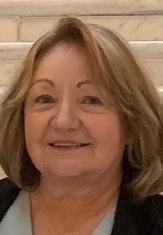
3. Continue to work for the reform of development authorities in Georgia which has begun with the passage of HB 923 in 2022.
Georgia is a politically diverse state. How will you work to represent Georgians whose political views differ from your own?
HILTON: Courage and intellectual curiosity are paramount to representing
Hear from doctors in your area about Inspire, a sleep apnea treatment that works inside your body. No mask. No hose. Just sleep.
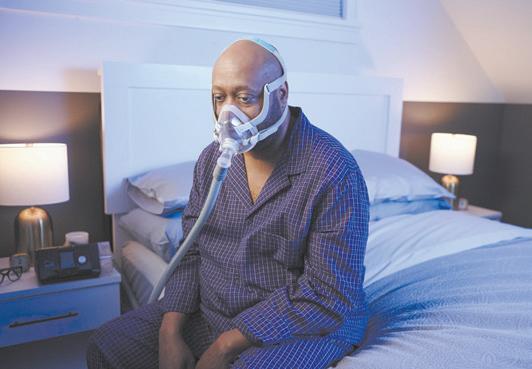

Visit InspireSleepEvents.com to register for a free event.
Inspire is not for everyone. Talk to your doctor to see if it’s right for you, and review important safety information at InspireSleep.com.
Want to go from restless... to well rested?
Georgians of differing political view points. I will have the courage to meet with those who hold beliefs that are op posite of mine. I will have the intellectual curiosity to seek to understand their position and openness to find a com mon ground. My constituents will always have access to my personal cellphone, email and ability to join town halls in our district.
ROBICHAUX: Through commit tee and commission assignments, I work with key members of both parties to craft legislation that benefits both District 82 constituents and all Geor gians. Being in the minority party often makes this difficult, but perseverance and building long-term relationships can accomplish much. I am the only Demo crat to chair a committee in the House, which shows my ability to work across party lines.
Who has been the biggest influ ence on how you view state govern ment and politics? What have you learned from this person?
HILTON: As a former member of the Gov. Brian Kemp’s staff, I witnessed firsthand as the governor success fully navigated our state through the coronavirus pandemic. I learned the importance of listening to Georgians and leading with courage. The governor would always do what he thought was best and right for Georgia, even while pundits and some in his own party disagreed. The governor is humble and one of the hardest-working individuals I’ve ever met. All of these attributes have influenced my own leadership style and are characteristics I take to my role in public service.
ROBICHAUX: There have been many people who have influenced both for good and bad. Jimmy Carter has consis tently maintained the highest values in public service. He has set a high bar for every Georgia politician.
Georgia has a lot to offer current and potential residents, but many parts of the state are becoming increasingly unaffordable. Please explain your proposed approach to address housing affordability through legislation and executive actions?
HILTON: With thoughtless spend ing from Washington, D.C., and now rising interest rates, the dream of home ownership is becoming out of reach for so many Georgians. One of the best tools for growing our middle class is equity built through home ownership. A highpaying job is one of the best ways to af ford a home. As a state representative, I
will focus on economic development and bringing high-paying jobs to our state. I will also focus on workforce development and equipping individuals with the skills they need to navigate changing employer needs.
ROBICHAUX: I have worked with the City of Decatur in various ways to enhance housing affordability and tax exemptions, and local legislation can preserve affordability in some cases. I have also worked for similar measures for homeless populations through HB 1013 and am seeking more options for affordable housing on a permanent basis. “Housing first” must be imple mented.
Politics is often about compro mise. How do you decide when to compromise and take small, incremental wins, and when to refuse compromise?
HILTON: A veteran state senator once told me that our work at the state Capitol was about relentless incremen talism. This approach — a constant striving toward improvement in Geor gia — can be a good one. In the private sector, compromise is used frequently to build consensus and complete a shared task. With that said, I will never compro mise on my core values of faith, family and limited government. Oftentimes, these can be tested as a legislator. The sign of a good representative is someone who stands firm in their beliefs. I believe constituents ultimately respect and trust someone they know will consistently stand up for them.
ROBICHAUX: Compromise is the hardest task in politics, and it is always painful to walk away from a potentially successful negotiation. Compromise is appropriate when dealing with leg islation that improves the lives of all Georgians. Compromise is difficult but necessary, and it requires discipline and patience.
There were politicians who questioned the outcomes of Georgia elections in 2018 and 2020. Do you think Georgia’s elections are secure and will you stand by the results?
HILTON: Yes, Georgia’s elections are secure, and I will stand by the final results.
ROBICHAUX: I believe that Georgia’s elections are secure, and I stand by the
results of the 2018 and 2020 elections. Both elections were subject to great scrutiny which proved the integrity of the election results.
In light of the U.S. Supreme Court’s decision on abortion, state law and local enforcement authority will determine access to abortion. In light of the U.S. Supreme Court’s decision on abortion, state law and local enforcement authority will determine access to abortion. If elected, how will you use your authority in the State House to influence abortion access or enforcement of abortion restrictions?
HILTON: As a state representative, I will support life from conception until natural death. We must step up to sup port working families, foster children and access to adoption. We need to ensure that women have access to the medical care they need, including ac cess to contraceptives and OB-GYNs in every county. We need to make it easier for children to find loving homes. The subject of abortion can be incredibly di visive. We need leaders who will take the time to listen and bring people together on this sensitive subject. You can trust that I will take the time to listen every single constituent on this issue and fos ter healthy dialogue.
ROBICHAUX: The General Assem bly should not pass any more restric tive abortion laws that would make the current situation worse. At this time, the possibility of any laws improving ac cess to abortion in the Georgia General Assembly seems unlikely. We must not allow further harm.
Are there any programs/legislation you’ve sponsored or created to help people with disabilities?
HILTON: As the father of a child with a disability, I am incredibly pas sionate about serving individuals with disabilities in our state. As a former state representative, my very first bill removed derogatory language defining people with disabilities from Georgia’s statute. When reelected, I will champion programs to give parents more choice in their child’s education and fight to ex pand Medicaid access for the thousands of qualified families on our waiting list.
ROBICHAUX: I serve on the Human Services Appropriations Subcommittee, and every budget cycle we increase the number of available waivers for develop mentally disabled Georgians. Enhancing vocational rehabilitation and passing legislation prohibiting discrimination against disabled Georgians are long term goals.
Georgia closed out its budget year with a “likely record surplus, billions
of dollars in federal aid and a growing economy.” Georgia spends more than half of this money on educa tion and health care. What would you want to see in the budget in terms of spending or taxes?
HILTON: Thanks to conservative leadership, Georgia is in the enviable position of having surplus tax dollars to both serve our communities and return excess to our constituents. States shut down their economies while growing government, including California, Il linois and New York, are now suffering the painful consequences. Residents are flocking from those states to Georgia due to fiscal conservatism. One of the clear est distinctions between the two parties in our state is how each would spend your money. As a conservative, I believe government shouldn’t be in the business of making a profit and any excess should be returned to the taxpayer. At the same time, we should prudently invest in in frastructure, education, health care and public safety.
ROBICHAUX: There are multiple statutory “rainy day” funds, and we have always overfunded them. The reserve funds are now the largest they have ever been in my long political career, along with unprecedented tax surpluses. The Appropriations Committee must bal ance rebate to taxpayers with a plan for strengthening human services, particu larly education and health care. Gov. Kemp has distributed surplus funds without a strategic plan for future pro grammatic growth. And in doing so has had no bipartisan review nor public dis cussion of any kind. The governor is not putting forth coordinated policies that evidence better health care and educa tion services for all Georgians.
The Legislature often votes along party lines. When would you seek bipartisan action and what issues merit such consensus?
HILTON: For my very first bill, I walked across the aisle and asked my Democratic colleague if he had a good idea. He had an excellent idea to solve a problem that was plaguing our state. We subsequently worked together to author and pass a bill that benefited all Geor gians. Many politicians, including my opponent, talk about being bipartisan but few have the record to back it up. I believe we’re at our best when we work together. That’s the approach I will take to my work at the Georgia Capitol.
ROBICHAUX: Much of the legis lation i have sponsored in the past, including mental health, criminal justice reform, juvenile justice issues, adop tions and social service needs, has had bipartisan support because the issues addressed affect all Georgians. No major reform can succeed without a bipartisan process.
House: Check your voter status and polling place at mvp.sos.ga.gov
How does your background equip you for the job you are seeking?

REDDY: I am a first generation im migrant who came to this country for a better life. Within a few years of moving to America, I earned a Master in Busi ness Administration degree and started my own business. This would never have been possible in my home country of India. I’ve been in business now for over 35 years, and have seen my two daughters become medical doctors and achieve their American dream. I have also been appointed by the last three governors to serve on the board of the Georgia Regional Transportation Au thority, where we have addressed infra structure matters for the state. Now, I want to take my experience and passion for education to the State Legislature to help the citizens of Johns Creek.
AU: I am a sitting Georgia state sen ator representing District 48, which en compasses House District 50. As such, I already have experience doing this job
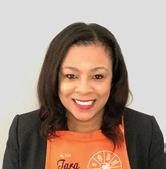
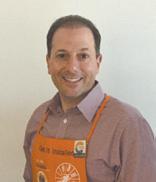



and representing this group of constituents. I am also a practic ing physician with an advanced degree in public health, which provides a unique perspective on how our health care sys tem can be improved to best serve Geor gians. Experience in health care is vastly underrepresented at the Capitol, despite health care costs representing one of the largest portions of our state budget. It’s one of the few public policy areas every Georgian interfaces with and cares deeply about. I’ve proven to be an effective leader at the Capitol by au thoring and informing health care legisla tion, including laws that lower costs, improve access, mitigate substance abuse risk and improve mental health
outcomes. I’ve also blocked bills threat ening reproductive health care.
What role should government have in the lives of Georgians? How would you apply that philosophy to the job you are seeking?
REDDY: The government’s primary responsibility is keeping its citizens safe from harm and ensuring our students have a world-class education. As a busi nessman, I will work to make sure it’s easier, not harder, to own and operate a business in Georgia. I want to protect our status as the No. 1 place for do ing business. And I want to encourage more investment in public education so that our students are equipped to fill the good, high paying jobs of the 21st century.
AU: Fundamentally a government should protect, provide, and invest in its people. “Protection” encompasses support of law enforcement, legislation enhancing public safety and proactive mitigation of future harms. One way I have done this is by authoring several bills to mitigate gun violence, including a universal background checks bill to keep guns out of the hands of those convicted
of felonies or domestic abusers. “Provide” includes helping individuals or families access resources they cannot access alone. As a state senator, I authored a bill requiring health insurance com panies to cover the costs of emergency medical care, and an iteration of my bill was signed into law this past year. “In vest” involves cultivation of resources to ward growing Georgia’s future. As state senator, I have consistently championed investment in our public schools and education system, to ensure that we are helping our children to build a future worthy of their potential.
If you are elected (or re-elected), what problems will you spend the most time solving and why?
REDDY: My main priorities will be focused around investments in public education and public safety. The pan demic school closures have proven to be harmful to many of our students and we cannot afford to leave them behind. We must also address rising crime rates and make sure Johns Creek remains a safe place for families.
AU: In 2020, as now, I ran for office because I knew that Georgia is one of the sickest states in the nation. We see that reflected in our high uninsured rates and corresponding skyrocketing premium costs. We see that in terms of our maternal and infant mortality rates, which rank among the worst in the na tion. And we see it when we look at our long-term health outcomes for condi tions such as heart disease, diabetes and cancer. As a physician I have made it my life’s work to take care of patients, provide the best care I know how, and to “first, do no harm.” I further believe that there are harms of inaction, and so in continuing to serve as a legislator, I will continue to use my energy and experi ence in both public health and the state senate to fight for a healthier Georgia.
Georgia is a politically diverse state. How will you work to represent Georgians whose political views differ from your own?
REDDY: I have been an active leader in the Indian-American community for decades where I have worked hand in hand with immigrants like myself who have differing views on politics and policy. I will bring that experience to the state Capitol, and I will always keep an open mind when discussing policy mat ters, even with those who disagree with me.
AU: Though much is made of our politically polarized government, as a sitting legislator I can attest that the vast majority of legislation we vote on actually ends up passing unanimously or very nearly so, with agreement on both sides of the aisle. There are, of course, a subset of bills on which the parties fundamentally disagree. Howev er, reasoned disagreement — played out in respectful conversation and thought ful debate — remains the basis of our political system. The district I serve is quite diverse, both demographically and politically. But as a legislator it is my job to represent all my constituents at the Capitol, not just those people voted for me. A key part of this job is to keep an open mind, to solicit input and feedback broadly on issues important to a major ity of my community, and then to work to advance those interests.
Who has been the biggest influence on how you view state government and politics? What have you learned from this person?
REDDY: I have great respect for former Gov. Nathan Deal and the way he led Georgia out of the recession. His leadership put us on a path to the suc cess we are experiencing today. He was
never afraid to work across the aisle when needed, while standing firm on his principles.
AU: Politics is the art of consensus building, listening, effective communica tion and tenacity, played out publicly under a set of highly formalized rules and procedures. But none of these skills is specific to politics, and therefore my political role model is not a politician at all, but a clinician, Dr. Glenda Garvey, with whom I trained at the Columbia University College of Physicians and Surgeons. One of Dr. Garvey’s greatest skills was her keen sense of observation, which she used not only to identify solu tions to complex problems, but to find commonalities between people and build relationships. Politics, at heart, is about relationships, and it’s far easier to move past superficial differences and build consensus when you trust each other. Most importantly, Dr. Garvey taught me that commitment to public service and advocacy for those who have entrusted us with their care must animate all we seek to do.
Georgia has a lot to offer cur rent and potential residents, but many parts of the state are becom ing increasingly unaffordable. Please explain your proposed approach to address housing affordability through legislation and executive actions?
REDDY: The legislature should make sure that we keep costs for families as low as possible. That starts with re sponsible spending and keeping taxes low. We have seen in recent years that Georgia can cut taxes while still provid ing historic investments in education, increasing pay for teachers and police officers, and sending tax rebates back to taxpayers. As a fiscal conservative I be lieve citizens are best equipped to decide how they spend their own money rather than giving more to the government.
AU: North Fulton County is a quickgrowing and extremely desirable area to live in because of our excellent schools and quality of life. But high housing prices preclude this choice for many. While zoning and many housing issues are under the jurisdiction of municipal governments, the State Legislature has the ability to combat regulatory and market barriers to affordable housing. Some solutions might include tax incen tives or subsidies to increase our supply of affordable homes near job centers and transportation hubs, create incentives and requirements of local governments for affordable housing plans and devel opments, as well as expand resources available for affordable housing. We should prioritize ensuring that people like our seniors, law enforcement, teach ers, first responders, small business owners, and young families can continue to afford to live in our communities here.
Politics is often about compro-
mise. How do you decide when to compromise and take small, incremental wins, and when to refuse compromise?
REDDY: I will never compromise when it comes to making our community safer or ensuring our kids have a great education. I am willing to listen and work with anyone from either party who shares those priorities.
AU: “Perfect is the enemy of good.” In all facets of my life — as a mom, doctor or as a politician — I’ve found there is very little role for absolutism. Taking an all-or-none approach very rarely gets as much done as keeping an open mind, being willing to engage in good-faith dialogue, and compromise. With many bills I’ve worked on in the Legislature, I did have to cede ground or not “win” on every single point in order to serve the larger goal. Sometimes imperfect legisla tion can still help a lot of people, and most laws are imperfect. There are, how ever, a few instances in which compro mise cannot enter into my calculation. One is when compromise would serve what I view as an absolute moral wrong. One such law that comes to mind is Georgia’s extreme abortion ban, which I strongly feel violates fundamental medi cal ethics and harms patients.
There were politicians who questioned the outcomes of Georgia elections in 2018 and 2020. Do you think Georgia’s elections are secure and will you stand by the results?
REDDY: Yes
AU: There are in fact two issues at play here. Do I think Georgia’s elections were secure? Yes. The candidates who earned the most votes should be recog nized as duly elected. This should be the case regardless of whether we as indi viduals voted for those winners or not. The second part of this discussion, how ever, is about voting accessibility and the method and process of how ballots are cast and counted. Elections are won by those who get the most votes in the end, but if it’s harder for certain groups of voters to cast votes for the candidates of their choice, that’s a violation of our democratic electoral system, where each vote is free and carries the same weight. Therefore, moving forward, I’d like to ac knowledge and address such challenges to voting rights and access in Georgia.
In light of the U.S. Supreme Court’s decision on abortion, state law and local enforcement authority will determine access to abortion. In light of the U.S. Supreme Court’s decision on abortion, state law and local enforcement authority will de termine access to abortion. If elected, how will you use your authority in the State House to influence abortion access or enforcement of abortion restrictions?
REDDY: I will oppose efforts by Democrats who want to allow abortion up until the moment of birth. This radi cal policy position is out of touch and out of line with how most Georgians feel about this issue. Georgia’s heartbeat bill currently allows exceptions for abortion in the cases of rape, incest, life of the mother, or fetal abnormality. I will sup port that policy as state representative.
AU: As a physician, I took an oath to “first do no harm.” And Georgia’s sixweek abortion ban, signed into law in 2019, fundamentally violates that oath. It violates the core medical ethics tenet of patient autonomy: patients get to determine how to use their own bodies and choose their own care. It actively harms patients by encouraging delayed or denied best-practice care determined by medical professional societies and experts in the field, which will lead to physical harm or death of patients. And it criminalizes healthcare practitioners for doing their job. Not only will I con tinue to work on legislation to roll back our current abortion ban (which by all measures was sloppily written with myr iad unintended effects), I will continue to block further restrictions to reproductive healthcare, like the bill we saw in 2022 (Senate Bill 456) banning telemedicine access for medication-induced abortion care.
Are there any programs/legislation you’ve sponsored or created to help people with disabilities?
REDDY: If elected I look forward to making sure those with disabilities have every resource available to them in order to thrive.
AU: People with disabilities dispro portionately face high health care costs and barriers to access to health care. The first bill I authored in 2021 makes it illegal for health insurance compa nies to deny emergency medical care claims sought under what is known as the “prudent layperson standard.” Es sentially, if a patient with no specialized medical knowledge seeks emergency medical care on the presumption that their injury or symptoms could be lifethreatening or portend serious impair ment of bodily function, that care has to be covered. The harms averted by this law are twofold. First, if patients can’t even get basic emergency care covered by their insurance companies, it defeats the purpose of paying for that coverage at all. Second, it minimizes the chances that patients will avoid care out of fear of devastating unexpected costs. When health care is avoided, it leads to worse health outcomes and higher health care costs for everyone.
Georgia closed out its budget year with a “likely record surplus, billions of dollars in federal aid and a grow-
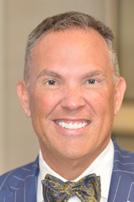
With online academics and home schooling gaining in popularity, it’s no surprise that dedicated spaces for study and homework are trending. Even though the pandemic-influenced home study has eased and in-person classes are back in session, having a space designated and organized for work makes sense. It cuts down on chaos, promotes efficiency, de creases distractions and sets up students of all ages to succeed. Multiple options exist for customizing study zones in a way that complements your space and meets your needs—here are a few ideas:
1. Bedroom built-ins.
If your home doesn’t have the square footage to devote an entire room to
study, customizing one or more bed rooms to do double duty with built-in bookcases, shelves and a work area eas ily maximizes space while providing turn key upgrades that add to your home’s value and appeal.
2. Converted unused flex space.
Many homes have flex space—think attics, walk-in closets, basements or that awkward stretch of real estate underneath the staircase—that can be converted to a study/work area with a few simple adjustments, like the addition of shelves, lighting and a desk.
3. Lighting and outlet access.
Positioning a workspace in order to maximize the available natural light is an easy and affordable upgrade for any study zone. Consider adding additional electrical outlets if there are a limited number, as well as upgraded lighting.
Never underestimate the impor tance of a good system for organiz ing and storing books and supplies. Floating shelves, organizing systems, built-in storage and overhead cabinets all provide solutions for clutter while simultaneously increasing visual ap peal.

Designing a study space to appro priately meet the needs of the students using it means that some homework
zones require wipeable surfaces, bright colors and smaller-sized furniture; some benefit from creative and inspiring décor and others need to reflect a minimalist aesthetic to minimize distractions.
The study/homework space trend is all about recruiting your space to work for you. It’s not only about enhancing the aesthetics of a room but also about increasing your home’s organization and efficiency, which is guaranteed to boost its appeal and add to your home’s market value. If you need assistance renovating your home or have any other real estate needs, please contact Atlanta Fine Homes Sotheby’s International Realty at 770.442.7300. We would be happy to assist you!
Compiled and edited by Angela Va lente, Marketing Copywriter/Copyeditor









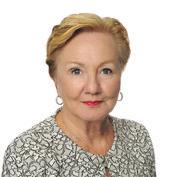

TRILITH | FAYETTEVILLE
From the $500’s - $3 Million+
FIRESIDE FARMS | DAWSONVILLE
Coming Soon From the $700’s
KELLY MILL RESERVE | CUMMING From the $700’s
LONG HOLLOW LANDING | GAINESVILLE From the $700’s - $1 Million+
TRILITH | FAYETTEVILLE
From the $500’s - $3 Million+
RIVER GREEN - LAKESIDE | CANTON Active Adult From the $500’s
RIVER GREEN - THE RETREAT | CANTON From the $400’s+
SOUTH ON MAIN | WOODSTOCK From the High $600’s - $900’s
THE ENCLAVE ON COLLIER | ATLANTA From the $900’s
THE ENCLAVE AT DUNWOODY PARK DUNWOODY | From the $800’s
THE ENCLAVE ON LAVISTA | TUCKER From the Low $800’s
THE HERITAGE AT ACWORTH | ACWORTH From the $500’s
TRILITH | FAYETTEVILLE
From the $500’s - $3 Million+
THE HOMESTEAD AT MILTON | MILTON
From $3.5 Million - $8 Million
THE MANOR GOLF & COUNTRY CLUB | MILTON From $2.6 Million - $10 Million+
SPRINGS | NEWNAN Active Adult From the $700’s

TRILITH | FAYETTEVILLE From the $500’s - $3 Million+

HILLANDALE | ROSWELL From the $900’s - $1 Million+
HORIZON AT LAUREL CANYON | CANTON From the $600’s - $900’s
KYLE FARM | WEST COBB From the Mid $600’s - $900’s
SOLEIL AT BELMONT PARK | CANTON Active Adult From the $500’s
SOLEIL SUMMIT CHASE | SNELLVILLE Active Adult Coming Soon
THE RESERVE AT GOVENORS TOWNE CLUB ACWORTH | From the $600’s
GIN PROPERTY | SENOIA Townhomes from $900’s
LAUREL BROOKE | PEACHTREE CITY From $1 Million+
TRILITH | FAYETTEVILLE From the $500’s - $3 Million+

GIN PROPERTY | SENOIA
Single family homes from the $600’s Townhomes from $900’s

THE HOMESTEAD AT MILTON | MILTON From $3.5 Million - $8 Million
OUR AWARD-WINNING BUILDERS
HONORED AT THE ATLANTA HOMEBUILDERS ASSOCIATION OBIE AWARDS
The Greater Atlanta Home Builders Association hosted the 42nd annual Pro fessionalism (OBIE) Awards Saturday, October 22nd at the Georgia Aquarium in downtown Atlanta. Berkshire Hatha way HomeServices Georgia Properties’ New Homes Division, led by President Lori Lane, and their builder clients took home a record 37 gold awards and 25 silver awards.
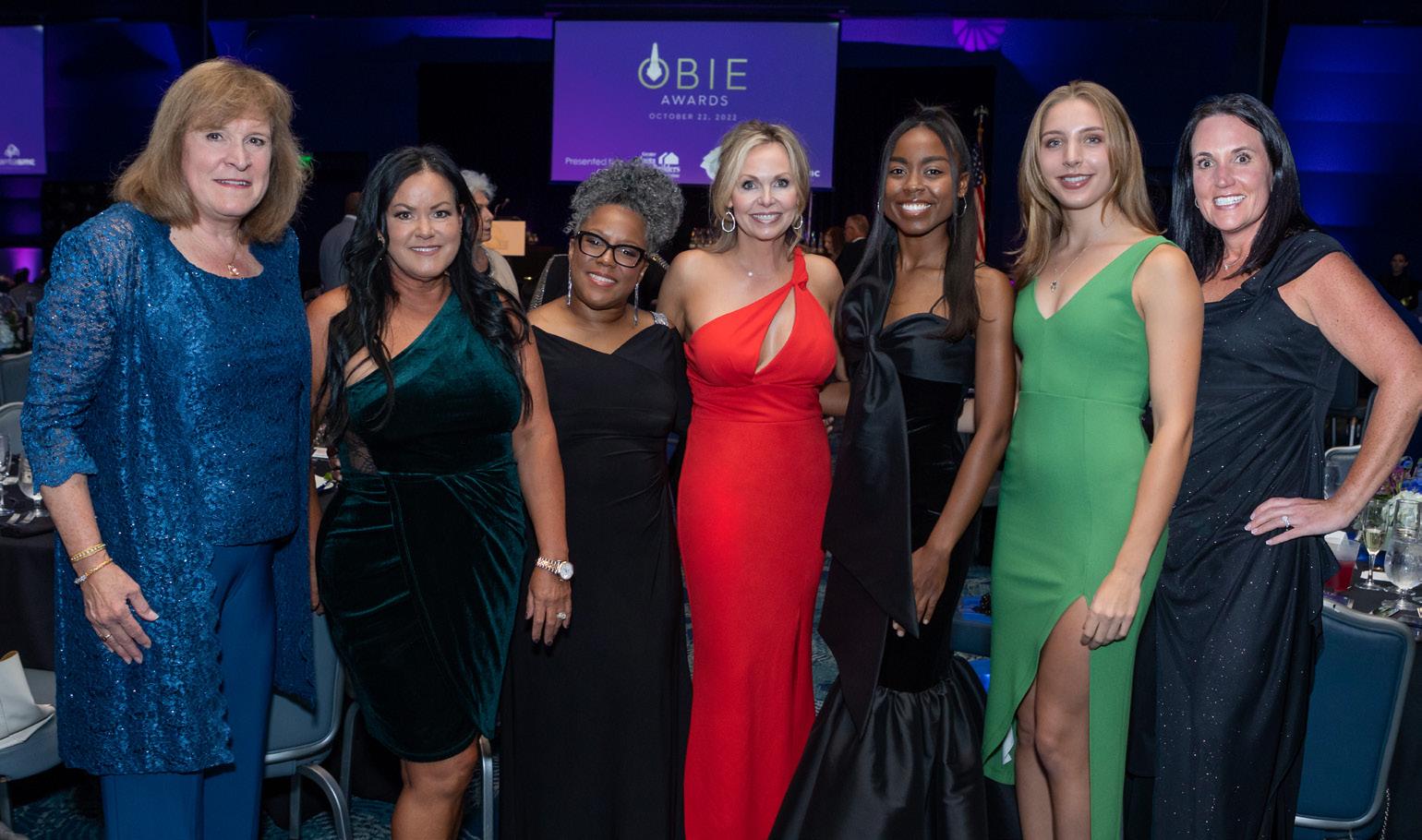
With over 100 different categories, the OBIE awards celebrate outstanding achievements in homebuilding and high
you by - Berkshire Hathaway HomeServices GA Propertieslight those in the homebuilding industry for excellence in building, marketing, and personal achievement. This year Berkshire Hathaway was honored to re ceive the gold award for Best Marketing Campaign, Best Advertising Campaign, Best Interactive Tool, Best Email Mar keting Message and Best Sales Center, to name a few. In addition to winning numerous marketing accolades, Berk shire Hathaway’s builder clients Trilith Development, Patrick Malloy Communi ties, JW Collection, Brett Baker Homes, McKinney Builders, David Patterson
Homes, Vision Development Partners, Loudermilk Homes, Redwood Homes, Senoia Enterprises and 1023 Construc tion all received top honors.
“Lori continues to raise the bar as Atlanta’s leader in new homes sales and marketing,” said DeAnn Golden, Presi dent and CEO of Berkshire Hathaway HomeServices Georgia Properties. “I am so proud of Lori, her talented marketing team and their builder clients and I join our entire organization in congratulating them on these well-deserved accolades.”
“It was an amazing night and so nice to see so many in our industry come together to celebrate homebuilding.” said Lori Lane. “My team and I are proud to work with the best in the industry. Our clients are dedicated to developing and building award-winning communities and it is truly a privilege to be part of their success.”
For more information on our new home communities and available new homes, please visit www.BHHSGANe wHomes.com.

















$0 premiums, $0 copays at your doctor and $0 copays for many prescriptions
With HumanaChoice H5216-203 (PPO), your monthly premium is $0. Your primary care physician (PCP) copay is $0. And you pay $0 copays for Tier 1 and Tier 2 prescription drugs.* This plan delivers savings—and beneits designed to support your whole health and help you reach your goals, such as:
• No referral required to see in-network specialists
• Dental, hearing and vision coverage
• $0 copay for SilverSneakers® itness program
Call a licensed independent sales agent
Jay Looft
770-913-6464 (TTY: 711)
9 a.m. – 5 p.m. Jay@SeniorSourceMedicare.com
* For 90-day mail delivery. The $0 copay applies to Tier 1 and Tier 2 medications using a mail-delivery pharmacy with preferred cost sharing after any applicable deductible is met.
Humana is a Medicare Advantage PPO organization with a Medicare contract. Enrollment in any Humana plan depends on contract renewal. Applicable to HumanaChoice H5216-203 (PPO). We do not offer every plan available in your area. Any information we provide is limited to those plans we do offer in your area. Please contact Medicare.gov or 1-800-MEDICARE (TTY users should call 1-877-486-2048), 24 hours a day/7 days a week to get information on all of your options. At Humana, it is important you are treated fairly. Humana Inc. and its subsidiaries comply with applicable federal civil rights laws and do not discriminate on the basis of race, color, national origin, age, disability, sex, sexual orientation, gender, gender identity, ancestry, ethnicity, marital status, religion or language.English: ATTENTION: If you do not speak English, language assistance services, free of charge, are available to you. Call 1-877-320-1235 (TTY: 711). Español (Spanish): ATENCIÓN: Si habla español, tiene a su disposición servicios gratuitos de asistencia lingüística. Llame al 1-877-320-1235 (TTY: 711). 繁體中文 (Chinese): 注意:如果您使用繁體中文
from Page 14
ing economy.” Georgia spends more than half of this money on education and health care. What would you want to see in the budget in terms of spending or taxes?
REDDY: I hope to see more invest ments in our public education budget so that teachers have every resource avail able to them in order to provide our kids with a world-class education.
AU: This is a no-brainer. The best way to use our oft-touted budget surplus is to reinvest back into the future of the state and cut costs. It is absolutely imperative that Georgia finally fully expands Medicaid under the provisions of the Affordable Care Act. This is a sound fiscal argument. Georgia has one of the highest uninsurance rates in the nation — largely because of our contin ued refusal to expand Medicaid— and so many of our hospital systems are closing due to the cost of uncompensated care. These factors end up costing us all more in our tax bills and in premium rate hikes. Fully expanding Medicaid would infuse cash and resources into our struggling hospital systems, trigger even more federal funds to flow into Georgia to create jobs and industry.
The Legislature often votes along party lines. When would you seek bipartisan action and what issues merit such consensus?
REDDY: While Democrats have refused to work across the aisle on most major legislation in Georgia I applaud their willingness to work with Repub licans for the passage of the Mental Health Parity Act that will hopefully transform mental healthcare in our state. I look forward to their same will ingness on other issues that have real impacts on Georgians.
AU: I seek bipartisan consensus on essentially every bill I put my name on. Whether my colleagues across the aisle are open to that consensus is out of my control, but I believe the best way to get things done, particularly as a member of the minority party, is to put policy over partisanship. On the first bill I ever authored, a health care bill, all my top co-signers were Republi cans. They were also the other mem bers of the Senate who were health care practitioners, because we all rec ognized that the bill was good policy for patients. The second bill I authored, a gun safety bill, did not garner any Republican support. I wish it did, and will continue to try. Safety from gun violence should merit such consensus. I hope my Republican colleagues will eventually work with me on concrete, common-sense solutions to this critical public safety issue.
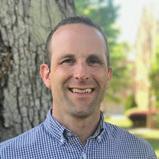

Republican candidate John Chan did not respond to the survey. He has been a business owner for 25 years. His priority issues are reducing crime, increasing pa rental rights, reducing taxes, increasing public safety, and helping businesses thrive. His website says he’s a “strong supporter of the Second Amendment” and is “an America First patriot who will secure our elections.” He opposes critical race theory and “all sexual indoctrina tion” of children in schools.
How does your background equip you for the job you are seeking?
ROMMAN: I am running to put public service back into politics and ensure that our government works for everybody. My experiences include work ing as a community organizer and civil rights advocate for organizations such as the Asian America Advocacy Fund, CAIR Georgia, and Georgia Muslim Voter Proj ect. Additionally, my master’s degree in public policy and experience as a senior consultant for a professional services management company assisting govern ment agencies and other stakeholders, has shown me how we can improve our government structures to work for all working families. These experiences make me uniquely qualified to become a state representative.
What role should government have in the lives of Georgians? How would you apply that philosophy to the job you are seeking?
ROMMAN: The role of government is to protect its citizens from exploitation and improve quality of life. The govern ment should only be involved in the lives of Georgians when necessary. Whenever I consider legislation or policy matters, I will consider how it will impact the lives of the people of Georgia and my commu nity. We must prevent the government placing unnecessary burdens on the lives of everyday people while protecting the most vulnerable among us.
If you are elected (or re-elected), what problems will you spend the most time solving and why?
ROMMAN: I want to put public service back into politics so that govern ment works for everyone not just the few. This includes protecting the rights of Georgians and improving our quality of life. Additionally, we must repeal the state’s ban on abortion and undemo cratic laws that undermine our right to vote. Finally, we must fully fund and end the dismantling of our public education system. We need to be investing in the
future of our state instead of oppressing people and passing draconian laws that help no one.
Georgia is a politically diverse state. How will you work to represent Georgians whose political views differ from your own?
ROMMAN: Not to sound like a broken record, but I truly believe in putting public service back into politics. That means I view it as my job to represent not just those who support me or agree with me politically but also those who do not. I will take into consideration input from everyone in my district as I make policy and voting decisions. Many of the issues the Legislature deals with are not partisan in nature, but ultimately even on the most divisive issues I will work to be transparent, honest, and acces sible with my constituents. This includes holding regular town hall meetings, responding to emails, calls, and social media feedback, and meeting with com munity members and stakeholders. My goal is to be responsive and fair. My phi losophy is to meet people where they are at without forgetting where I come from.
Who has been the biggest influ ence on how you view state govern ment and politics? What have you learned from this person?
ROMMAN: My political journey began on the Michelle Nunn and Jason Carter campaign. They made an effort to reach out to college students like myself at the time and showed us how to get in volved politically. I don’t know if I would have taken this route politically without that original political home they gave me. But, until 2018 I assumed my place in politics would always be behind the scenes or that I could only do so much. It was Aisha Yaqoob who showed me that I could have a place in this politi cal world while being authentically who I am. She ran in the same district I’m running in now while being authentically herself. Because of her, I truly began to see the role my community can play po litically. Ironically, here I am running for office myself. I’m not sure I would have had the courage to do that without her.
Georgia has a lot to offer cur rent and potential residents, but many parts of the state are becom ing increasingly unaffordable. Please explain your proposed approach to address housing affordability through
legislation and executive actions?
ROMMAN: We need to implement housing policy that protects renters and those seeking to buy a home, along with current homeowners. We need to promote the creation of more market-based hous ing that fits the needs of our workforce, seniors and young families. We can cre ate a fund to promote the development of more affordable housing and reform our rental laws to protect tenants’ rights. Finally, I would explore ways to protect families and first-time home buyers from being pushed out of the housing market by corporations so that everyone has a fair chance at finding a home for them selves and their families.
Politics is often about compromise. How do you decide when to compromise and take small, incremental wins, and when to refuse compromise?
ROMMAN: We cannot compromise on sacred, fundamental rights and values that make our country what it is. However, most forms of political, and legislative progress are achieved by working towards progress and incremen tal gains. I will listen to my constituents and work to ensure that I am voting and acting in a manner that reflects their wishes. At the end of the day, those in public service must work towards mak ing our state the best that it can possible be for all of its residents.
There were politicians who ques tioned the outcomes of Georgia elections in 2018 and 2020. Do you think Georgia’s elections are secure and will you stand by the results?
ROMMAN: I want to be incredibly clear here. We can go back and forth on policy, but respecting our election re sults is beyond fundamental. The attack on the U.S. Capitol on Jan. 6, 2021, showed us that there are people willing to threaten centuries worth of peace ful transitions of power for their own personal gain. It is one thing to suggest that policy positions prevent people from voting, but it is something entirely differ ent to prevent people who have the right to vote from voting, or worse yet threaten members of Congress with death if they do not install the person they want. Not only will I stand by election results, but I will do everything I can to make sure that people are empowered to become more civically engaged so that we can have a healthier democracy that is truly representative of all of us.
In light of the U.S. Supreme Court’s decision on abortion, state law and local enforcement authority will determine access to abortion. If
elected, how will you use your authority in the State House to influence abortion access or enforcement of abortion restrictions?
ROMMAN: I believe in protecting reproductive choice and freedom. Repro ductive healthcare, including abortions must remain accessible to the people of Georgia. Republicans have chosen to attack the rights of women and create a second-class status for women in this country in light of the repeal of Roe v. Wade and the implementation of a strict abortion ban in Georgia. Women’s lives are placed at risk by this decision, and I will work to sponsor and support legisla tion that empowers women and ends these draconian restrictions. Our state has a maternal health care crisis, and Republicans have only made it worse.
Are there any programs/legislation you’ve sponsored or created to help people with disabilities?
ROMMAN: While I am not a legis lator yet, I look forward to sponsoring legislation that will help people with dis abilities and their families. Disabled chil dren in particular are currently left in a bind due to state policies. We can reform programs like the Katie Beckett Waiver to make it easier for those with disabili ties and their families to qualify for the health care and support they need to make their lives better. I would also like to expand Medicaid in Georgia and end the policy where workers with disabili ties are frequently paid subminimum wage or otherwise trapped in poverty due to tax and regulatory structures as it relates to qualifying for benefits.
Georgia closed out its budget year with a “likely record surplus, billions of dollars in federal aid and a growing economy.” Georgia spends more than half of this money on education and health care. What would you want to see in the budget in terms of spending or taxes?
ROMMAN: I believe that one of the best ways to reduce costs is by making government more efficient and reducing wasteful spending. For far too long, the Georgia budget has been used to benefit only the few. We must continue to build and maintain a strong rainy-day fund to prepare for future recessions and other times of budgetary pressures so that we do not have to make deep austerity cuts that damage our state. I would like to see targeted additional spending in key areas, such as raising teacher pay to make our state more competitive and additional funds for key social services like protecting our children from abuse,
neglect, and hunger. I would also like to see the state increase the homestead exemp tion to lower property taxes and provide an additional income tax rebate for Georgians.
The Legislature often votes along party lines. When would you seek bipartisan action and what issues merit such consensus?
ROMMAN: Having a legislature that works toward bipartisan consensus is important. Too often we have seen Republicans use their power as the ma jority party to deny any input or legisla tive action from the Democratic party, even as Democrats work to represent their constituents and the communities they serve. In the Georgia Legislature I will strive to be an effective consensus builder because issues like strengthen ing our economy, reforming our tax and regulatory systems, keeping our com munities safe, addressing challenges around health care and education, and improving our quality of life should not be solely partisan issues. Our state deserves the best that we can invest in it, and we owe it to our constituents to work for them instead of special inter ests.
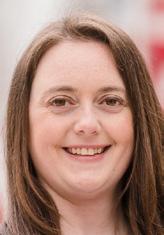

How does your background equip you for the job you are seeking?
THORNE: I have an engineering background in process management and an MBA. With my background, I have the skills and experience to ask the right questions, get the right answers and oversee the right solutions to put Fulton County on the road to better efficiency and accountability. My family and I have called Fulton County home for 27 years. During this time, I have been an active community volunteer working with many non-profit organizations. With the state of the economy and rising crime rates, there is an increasing need. Families are struggling with unprecedented inflation, so now is not the time to raise taxes. It is the time to take “fresh-eyes” review of Fulton County operations, to institute more effective best practices, to cre ate standard operating procedures and accountability measures. It is impera tive that Fulton County operates more efficiently and effectively.
GOLDMAN: One of my main mo tivations to run for commission is my experience as a real estate agent helping over 800 residents appeal their property taxes over the last seven years. I have seen how the county over assesses prop erties and how intimidated folks are by the tax appeal process. I want to ensure accurate assessments and to make the tax appeal process more accessible. In terms of education, I have a bachelor’s degree in political science and a mas ter’s degree in school counseling. Both of these degrees have helped me engage with others in ways that are the most productive. For example, as a Realtor, I am often managing the emotional con nection to a home my clients are experi encing and my counseling background helps guide me.
What role should government have in the lives of Georgians? How would you apply that philosophy to the job you are seeking?
THORNE: Fulton County Commis sioners have the job of overseeing the health and welfare of the entire county, coordinating services that are county wide. Budgets should be prioritized to achieve this responsibility. Right now, Fulton County is not healthy. Crime, homelessness, fentanyl dangers, the courts are backlogged – these are some of the top issues that need solutions. We need to get to the root of the prob lem and not simply throw money at it. As a commissioner, I will address the
root of the problem. I believe that the government clos est to people is the most effective. When your elected officials are your neighbors, there is more op portunity for open communication. As a Commissioner, I will keep my con stituents engaged and informed in the decision-making process. Fulton County needs to em power the people by advancing policies that create a more open, accountable, and responsive government. Trust needs to be restored.
GOLDMAN: I believe government should be a good steward of taxpayer funds to provide essential services to our residents. We should also be making sure that residents who need the most help are prioritized. One area I’d like to focus on in Fulton is lifting families out of homelessness. Another is ensuring full access to mental health resources as often and as widespread as needed. We should also be seeking solutions to the root causes of crime in an effort to reduce it.
If you are elected (or re-elected), what problems will you spend the most time solving and why?
THORNE: Crime & health: A third of the county budget is spent on pub lic safety. The overcrowding of the jail is a problem. It is dangerous for both inmates and correctional workers. Mayor Dickens of Atlanta seems to be institut ing more proactive policies than the pri or administration, like allowing Fulton to lease 750 beds at the Atlanta Detention Center. In addition, the court backlog is part of the problem. With the rapid violent crime increase in Atlanta our law enforcement needs to be equipped to protect our communities. But just throwing money at the problem is not the solution. We need to understand the why behind the increase in crime. Since all Fulton taxpayers are paying, they need a say in the policies that are both combating/contributing to rising crime rates.
Mental health, drug and substance abuse are also big issues. Grady Hospi tal will now have to take on more with
the closing of two hospitals. The con struction of a new Behavioral Health Center will provide much needed services. However, keeping costs man ageable, accountable and transparent to Fulton taxpayers will be imperative. As opioids/fentanyl flood into the northern suburbs, we need to continue educat ing our youth on the dangers of drug use. As a long-term Fulton resident, I have volunteered my services through out the years and have seen the value of non-profits working in these areas of concern. Fulton needs to create partner ships with non-profits to make a positive difference in the lives of all residents.
GOLDMAN: One of my top priorities is to fully fund the Fulton Board of Reg istrations and Elections to offer acces sible, efficient and transparent elections that are free of election conspiracies and false fraud allegations. Next, I’d like to offer case management services to our residents living in extended stay hotels to ensure they can develop the skills to obtain permanent housing. Third, I’d like to fully fund the district attorney’s and public defender’s offices, so they can correctly determine if someone is dangerous and needs to go prison, or they can go to a pre-indictment diversion program to keep them out of the prison system while still keeping the commu nity safe.
Georgia is a politically diverse state. How will you work to represent Georgians whose political views differ from your own?
THORNE: Fulton County has be come divided; north and south, black and white, Democrat and Republican. We need to put aside our differences. We need to come together for the unified purpose of making this county a great place to live for everyone. As residents, there are many issues where there is support and consensus. That’s a great place to start. It is time to BUILD bridges!
Presently, there is an example of a group of people of diverse backgrounds and political beliefs working together toward a common goal. It is the collabo ration and solidarity of all the Fulton County cities and their mayors, working together in a collegial manner on the Lo cal Option Sales Tax (LOST) negotiations with Fulton County. Although pres ently negotiations are difficult, mainly because of the county’s position, it is a glimmer of hope for further cooperation in the future on cross-county issues and projects.





















remains anonymous to this day once said, “Respect is earned, Honesty is ap preciated, Love is gained and loyalty is returned.”
GOLDMAN: I always like to seek common ground on issues that really matter to residents and stakeholders. A majority of the council members and mayors in my district are Republicans. I will seek out topics that are nonpartisan in nature and directly related to county services such as water service, mental health services and homelessness ser vices. If there are issues we don’t agree on and they aren’t specifically neces sary, we would simply agree to disagree. I have had success meeting with the council members I have met with in focusing on my plans for the county and what their needs are as a city.
Who has been the biggest influence on how you view government and politics? What have you learned from this person?
THORNE: While I do not have a specific influence on how I view state government, I respect people that stand on principal and truth, even when that principal or truth may not be popular. I am an advocate of the open and respect ful exchange of ideas, even when we disagree. As a thoughtful person who
GOLDMAN: I’ve always had an inter est in politics and a desire to serve my community. In 2019, I really became in spired by Pete Buttigieg, now the U.S. Secretary of Transportation, and his commitment to local service. He served two terms as a mayor of South Bend, Indiana, a city about the size of most of the cities in North Fulton. I certainly hope to emulate the honesty and integ rity he displays as a public servant. I respect the way he makes great effort to reach all stakeholders and residents regardless of party. He is also remark ably practical about what can be ac complished. We may both wish that we could enact various reforms that are not possible at the current time. We are both able to make the best deci sion of the available choices to create progress.
Politics is often about compro mise. How do you decide when to compromise and take small, incre mental wins, and when to refuse compromise?
THORNE: I consider myself a prin cipled person. I will not compromise my principles. However, if compromis
ing means searching for the common ground, focusing on where we agree, giving a little on both sides to reach a common goal, without sacrificing prin ciple, then compromise is OK. It is ironic that the historical figure who compared the crafting of laws to sausage making, also observed that “Politics is the art of the possible.”
GOLDMAN: I believe most decisions will involve small, incremental wins. In real estate, we are always about creating a win-win for the seller and the buyer. The times I would not be willing to compromise would involve threats to our constituents. For example, I would not vote to underfund our elections and risk not being able to perform an election. I am willing to look at a community staff ing model verses a temporary agency, but it needs to be phased in, so we can ensure the county can handle the addi tional recruiting, hiring, and payroll. The potential of the county to not perform an election, and risking the state taking over our election board, could threaten the certification of all Fulton County’s votes. That is a risk I would not be will ing to take.
There were politicians who questioned the outcomes of Georgia elections in 2018 and 2020. Do you think Georgia’s elections are secure and will you stand by the results?
THORNE: In 2018, long lines were caused by poorly trained/inexperienced workers. I worked with Fulton County Elections to come up with solutions.
I think Georgia’s elections are more secure than in 2020 but they still have a way to go. In 2021, two Fulton County Elections workers were fired for illegally shredding voter registrations. It is still not clear exactly what happened.
On Sept. 23, 2022, a Fulton County Elections employee mistakenly emailed sensitive voter data. The employee who called attention to the breach was pun ished by not being allowed to work. Ac tions like this do not foster an open and accountable work environment. I have an engineering background in process management, and based on standards and best practices in my work experience there are too many people who have access to sensitive voter data. The data must be secured and the ac cess limited. Temporary workers should not have access. Procedures should be in place to secure the data.
As always, I stand by the election results. However, Fulton County elec tions need improvement. We should have a goal of continually improving the integrity of our elections. It is imperative the processes are fair and transparent. Outside groups should not be involved in the process. Stakeholders in our com munity should be running our elections.

GOLDMAN: As Brad Raffensperger has said over and over again, 2020 was one of the most secure elections in Geor gia. I will absolutely stand by the results of any election in Georgia, and I have never given a reason to think I would not do so. I do think that all the attention and threats from individuals who doubt the outcome of the 2020 election have really placed an unmanageable burden on Fulton County. I believe because of the consistent threats to poll workers and election staff, we have not been able to recruit and hire a new permanent Fulton County elections director. Ad ditionally, the controversies have made it difficult for us to find recruiting firms willing to work with Fulton, as well as elections consulting firms. Hopefully the election conspiracies and threats will diminish, and we will be able to success fully hire a permanent elections director and outside firms will want to work with us again.
In light of the U.S. Supreme Court’s decision on abortion, state law and local enforcement authority will determine access to abortion. If elected, how will you use your author ity to influence abortion access or enforcement of abortion restrictions?
THORNE: As a commissioner, I would not have influence over abortion access. As a principle, I do believe in the rule of law. All people and institutions are subject to and accountable to the law, and the law should be fairly applied and enforced. Officials should not be able to pick and choose which laws they will or will not uphold.
GOLDMAN: The Fulton Commission has no authority to create policy on re productive rights. The commission does fund the justice system: the District At torney’s Office, Public Defender’s Office, the court system and the jail system. Fulton County District Attorney Fani Willis has committed to not prosecut ing any abortion cases in the county. I support her in this commitment. As the district attorney, she has prosecutorial discretion to make decisions she thinks are best for each case. If the residents of Fulton are not happy with her choices, they can elect a new district attorney when her term is up. That is the check and balance in place for this circum stance. A major concern of mine is that in the effort to investigate an abortion to identify a doctor to charge, you’d almost certainly have to inflict unbearable and unnecessary emotional harm on the person who experienced the abortion, or a miscarriage. The physical result of both an abortion and a miscarriage are so similar in nature that there is no way you could ensure you’d never investi gate a person who had a miscarriage vs. choosing to have an abortion.
I read this week that Kroger, the second largest grocer in the country, plans to buy Albertson’s, the fourth largest grocer, pending regulatory ap proval. The combined company would close the market-share gap with the largest grocer in the country, Walmart.
In the business world, “scale” is the key, or so the general held belief holds. The combined company – if the merger goes through – would have around 5,000 stores and almost 750,000 employees. But, at what cost?

you pay a cashier, a real live flesh-andblood human; same deal with my other favorite retailer, Costco. When you pay at many of the other big retail chains, instead of paying a human, you often pay a machine. Think Lowes. Think Kroger. Think more and more of the big boxes. Sure, these chains are able to hire fewer people and be more profitable. Nothing wrong with that, right? Maybe. Maybe not.
Nothing about that “feeling” though seems directly quantifiable or directly related to a better bottom line or to scale. Despite that, it is a priority; it is part of that corporate culture and value set at Publix and Costco. Why? How is that working for those two companies?
RAY APPEN Publisher Emeritus ray@appenmedia.comI shop at Publix, not Kroger, even though I think that Kroger is probably often cheaper. Why? Well for a number of reasons. I grew up in Florida where Publix is based, in Lakeland. I love their Key Lime pie. I feel at home in their wide aisles and in the smaller stores. When I shop, I know exactly where in the store I need to go that is, unless I am shop ping for Christina. Often, she sends me to buy obscure things that even Publix employees struggle to locate. But that is another column for another time.
My Publix stores are incredibly clean – like cleaner than a hospital – always. That is a big deal to me. Publix employees
are friendly, too, and they want to help – like always. Plus, they are there, the Publix worker-bees, unlike at the other grocers. Again, it’s a big deal to me that when I need help, there is almost always someone nearby to ask for that help.
Many things about Publix remind me of that TV show “Cheers,” a place where “everybody knows your name” and where you can go and feel like someone actually cares.
Today, “scale” seems so critical to large businesses. In theory it drives prices down and profits up because businesses are able to purchase goods in larger quantities. But again, what is the cost; what is lost when “scale” is the core business mantra? Perhaps a lot is lost.
When you get in line to pay at Publix,
When I go into a store or a service of any kind, the attitude of the employees is a big deal to me. Are they positive? Do they seem happy, or are they walking around like semi zombies being forced to sell their time because they have bills to pay? How does management quantify that? Should they?
When I shop at Publix or Costco, I feel like I am in a place where everybody knows my name, even if they don’t. When I shop there, it is obvious to me that the employees are not just putting in their time; they seem positive and glad to be there. They appear to have pride in being a part of what they do for a living. And if that is how they feel, I know that most likely reflects how they are treated by management and that how they feel must be at least as big a priority – if not more so – than “scale” to management.
These non-quantifiable things make me want to shop there, to be there. There is much value-added to me, enough to justify paying more.
One of my favorite things about shop ping at Costco is their “lunch area” where you can buy a jumbo hotdog and a cold drink for like $1.50, or a slice of pizza or ice cream for an equally small amount of money, and sit down right there in the store and have lunch. I read recently that a new CEO was named for Costco and one of the first things he did was to try to raise the rates of those hotdogs and pizzas to make the lunch area more profitable. “Over my dead body,” was the response that arrived to the CEO from the founder/chairman of the board.
My point is that today when scale and profitability increasingly are the single driving force in our lives, we must be very careful to not miss the costs that come with that business model and mindset – the human costs.
More is not always better. Cheaper is not always really cheaper. Substitut ing machines for humans in the long run sometimes actually costs more. Sometimes “enough” is better, healthier than “more.”
So that is why I shop at Publix –where shopping is (still) a pleasure.
Thank you George Jenkins.
More is not always better. Cheaper is not always really cheaper. Substituting machines for humans in the long run sometimes actually costs more.
As a consumer, investor and a saver for “rainy day” and future-focused goals and objectives, you must ask key questions. What are you to make of pessimistic cli mate change and global warming scenarios? How do you balance global concerns against personal needs to feed your family, gas up your car, while perhaps saving for long-term goals such as owning a home, funding for educations, and enjoying a comfortable retirement?
The approach taken by the Biden administration relative to climate change issues has a direct impact on the buy ing power of your money, driven to some extent by the “law of unintended consequences.” Margaret J. Wheatley, author and organizational change ex pert, asserts, “Probably the most visible example of unintended consequences is what happens every time humans try to change the natural ecology of a place.”
Every time we mess with the planet, even with the best of intentions, often there are unintended consequences.
Governments, especially in Europe and America largely have embraced “green new deal” initiatives. But the sun doesn’t shine 24/7. Wind doesn’t always blow. Draught in some areas has impaired hydroelectric power produc tion. Electric power in some locales cannot meet growing needs. As we see current limitations on clean energy and a continued demand for fossil fuels, political and economic conflicts must be reckoned with, regardless of where one stands politically relative to climate change debates.
OPEC’s decision to decrease oil production increases global inflationary pressures. The prospect of rising prices and potential shortages here at home, a very cold winter in Europe due to depen dence on Russian natural gas for heating, and more supply chain issues related to energy shortages and costs, have pre cipitated a growing round of government interventions in the marketplace.
Ludwig von Mises (1881-1973), the esteemed Austrian School economist, historian, and sociologist, warned, “Every government intervention [in the marketplace] creates unintended conse quences, which lead to calls for further government interventions.” This reality will continue to vex market prognosti cators and consumers worried about
“bread and butter” issues.
As an offshoot to climate change con cerns, environmental, social and gover nance (ESG) issues complicate the energy conundrum. ESG emerged as an idea focused on corporate interests related to sustainable and ethical impacts, often at tached to global warming issues. In tan dem with the Biden administration’s ac tions regarding pipelines and production of oil and natural gas on federal lands, incentives for banks and large investment firms, as well as oil and natural gas pro ducers, to invest in fossil fuel production as well as a needed expansion of refinery capacity, were reduced. Even if you’re a “hands off” index fund investor, you have a dog in the fight over fossil fuels. Exxon Mobil Corp., Chevron, and ConocoPhillips rank among the top 50 stocks in the S&P 500 Index based on market capitaliza tion, and their dividends are important to many retirees. Mutual funds and retire ment plans invest in indexes as well as blue chip stocks.
Even if you own an electric vehicle, there’s no escaping the Law of Unin tended Consequences. Electric bills are rising, as are costs to build and maintain home and highway charging stations. The Jobs Act of 2021 allocated billions to repair roads and bridges. But as Jacob Borden, associate professor of chemical and bio-process engineering at Trine University (formally Tri-State University) in Angola, Indiana, pointed out, you can’t build roads without oil. (Wall Street Journal, 10/6/22). As phalt is a byproduct of fuel production. Thirty percent of fuel production goes into byproducts like asphalt, sheath on electrical wires and cell phones, IV bags, pill casings, synthetics for clothing, etc. Eliminate fuel production, and what happens to essential byproducts and the costs to produce those? Unintended consequences.
With America no longer energy in dependent, relative to the production of gasoline, diesel, bunker fuel for ships (warships included), and aviation fuel, we
become increasingly reliant on current and future hostile governments. Many of the everyday products we consume de pend on China, an authoritarian regime that controls much of the exotic minerals, solar panels, windmill parts, etc., that power green dreams and an unintended consequence driven by globalism.
The fact that energy costs are linked to virtually everything else is a harsh reality. Persistent inflationary pressures are likely to push the Fed eral Reserve Bank to hike interest rates more aggressively. Global warming may be a concern, but so will freezing Europeans due to a shortage of lique fied natural gas (LNG). It takes natural gas to make fertilizers essential to crop yields, raising specters of starvation among poorer citizens in less devel oped countries. Schemes surrounding carbon taxes will hurt the poor every where.
On the bright side, difficulties and challenges often yield creative solutions. Political power may shift, as disgruntled consumers call for change as we saw in Italy. Out of common-sense neces sity related to security, America may yet return to being a dominant producer of oil and natural gas, the latter a relatively clean “bridge fuel” as we solve problems related to renewable energy.
Entrepreneurs, inventors, designers, and risk-takers will come to the fore with new ideas, processes, products, and inventions. Progress often is a child born of necessity in times of difficulty. Hang in there, pilgrim, and bet on yourself!
Lewis Walker, CFP®, is a life centered financial planning strategist with Capi tal Insight Group; 770-441-3553; lewis@ lewwalker.com. Securities & advisory services offered through The Strategic Financial Alliance, Inc. (SFA). Lewis is a registered representative and investment adviser representative of SFA, otherwise unaffiliated with Capital Insight Group. He’s a Gallup Certified Clifton Strengths Coach and Certified Exit Planning Advisor.

Katherine Coleman, 73, of Alpharetta, passed away October 23, 2022. Arrangements by Northside Chapel Funeral Directors & Crematory.
Helen Harris, 72, of Clarksville, passed away October 24, 2022. Arrangements by Ingram Funeral Home & Crematory.
Melvin Knowles, 98, of Alpharetta, passed away October 25, 2022. Arrangements by Northside Chapel Funeral Directors & Crematory.
Elizabeth Morley, 69, of Roswell, passed away October 21, 2022. Arrangements by Northside Chapel Funeral Directors & Crematory.
Robert O’Hagen, 84, of Alpharetta, passed away October 22, 2022. Arrangements by Northside Chapel Funeral Directors & Crematory.








Rose Webb, 95, of Alpharetta, passed away October 21, 2022. Arrangements by Northside Chapel Funeral Directors & Crematory.
Benjamin Winkler, 28, of Roswell, passed away October 24, 2022. Arrangements by Northside Chapel Funeral Directors & Crematory.



Part-time & Full-time positions available. Pay is $12-$14 per hour. Hours starting at 6:30AM, Monday-Friday. Pick-up truck not required but must have your own reliable transportation. Gas allowance provided. Looking for people who enjoy working outside and are enthusiastic, dependable & punctual. Able to contribute independently or on a crew with consistently friendly attitude.

Well-established commercial pool maintenance company providing service in the North Atlanta Metro area.
Call Bill: 404-245-9396
for busy Dermatology Practice; Cumming, Roswell and Alpharetta locations. Email resume to wmark@atlcenterforderm.com or Fax 770-751-7410.
SiteOne Landscape Supply, LLC seeks a SAP Commerce (Hybris) Sr. Development Lead to Analyze, design, implement, and test application software changes for the Hybris Ecommerce site. Teleworking is permitted within a reasonable commuting distance of the Roswell, GA worksite location. Send resume to Matt Jones at MJones2@siteone.com and reference job title.
Reliable,
• Flexible
• Competitive
• Safe,
• Opportunities for
reimbursement
Johns Creek Montessori School JCMSOG.org

Info@jcmsog.org
Seeking part-time Building/Facilities Assistant Manager for Alpharetta Presbyterian Church from about 12-4 Monday – Friday.
Candidate needs basic knowledge/competency in building maintenance and grounds keeping as well as strong interpersonal skills. Computer skills are desired.
Requires successful completion of a criminal record and child abuse background check, a valid driver’s license and the ability to perform physical tasks. Full job description can be seen at https://alpharettapres. com/about-us/jobs/.
Qualified candidates please send resume to office@alpharettapres.com
Onsite at his place of employment. Perfect for retired nurse. Helping with meal prep, drive to doctors appointments, some shopping. Salary negotiable. English speaking non-smoker. Charlotte 678-208-0774
PHILLIPS HOME IMPROVEMENT
We offer drywall, painting, carpentry, plumbing and electrical. Basements finished, kitchen and bath rehabs. All types flooring. Also total home rehab for those who have a rental house or one to sell. Call 678-887-1868 for a free estimate.
Decks repaired/built. Labor payment upon
Heritageconstruction.com. 30-plus years experience. John Ingram/678-906-7100. Act
increase next
TEAKWOOD TABLE, 8 chairs, China cabinet. $1000/obo. Call or text 404-433-3414
Company
Retaining walls (brick or wood), grading, sod, tree services, hauling, topsoil & more. Ralph Rucker 678-898-7237
Brick or Wood
Contact Ralph Rucker. Many local references. Honest, punctual, professional and reasonable prices! 678-898-7237
ROOF LEAKING?
local references Call Ralph Rucker 678-898-7237
Call us for roof repair or roof replacement. FREE quotes. $200 OFF Leak Repairs or 10% off New Roof. Affordable, quality roofing. Based in Roswell. Serving North Atlanta since 1983. Call to schedule FREE Quote: 770-284-3123.
Christian Brothers Roofing
PHILLIPS FLOORING Hardwood, laminate, carpet & tile installation and repairs. We do tile floors, showers, tub surrounds and kitchen back-splashes. Regrouting is also available. Call 678-887-1868 for free estimate.
Pinestraw
PINESTRAW, MULCH Delivery/installation available. Firewood available. Licensed, insured. Angels of Earth Pinestraw and Mulch. 770-831-3612

















VIAGRA and CIALIS USERS! 50 Generic Pills SPECIAL $99.00. 100% guaranteed. 24/7 CALL NOW! 888-445-5928 Hablamos Español
Dental insurance - Physicians Mutual Insurance Company. Covers 350 procedures. Real in-surance - not a discount plan. Get your free dental info kit! 1-855-526-1060 www. dental50plus.com/ads #6258

Attention oxygen therapy users! Inogen One G4 is capable of full 24/7 oxygen delivery. Only 2.8 pounds. Free info kit. Call 877929-9587
Become a published author. We want to read your book! Dorrance Publishing trusted since 1920. Consultation, production, promotion & distribution. Call for free author’s guide 1-877-7294998 or visit dorranceinfo.com/ ads
Put on your TV Ears & hear TV w/unmatched clarity. TV Ears Original - originally $129.95 - now w/this special offer only $59.95 w/code MCB59! 1-888-805-0840
DISH TV $64.99 For 190 Channels + $14.95 High Speed Internet. Free Installation, Smart HD DVR Included, Free Voice Remote. Some restrictions apply. Promo Expires 1/21/23. 1-866479-1516
The Generac PWRcell solar plus battery storage system. Save money, reduce reliance on grid, prepare for outages & power your home. Full installation services. $0 down financing option. Request free no obligation quote. 1-877-539-0299
Attention Homeowners! If you have water damage and need cleanup services, call us! We’ll get in & work with your insurance agency to get your home repaired and your life back to normal ASAP! 855-767-7031
MobileHelp, America’s premier mobile medical alert system. Whether you’re home or away. For safety & peace of mind. No long term contracts! Free brochure! 1-888-489-3936
Reader Advisory: The National Trade Association we belong to has purchased the above classifieds. Determining the value of their service or product is advised by this publication. In order to avoid




misunderstandings, some advertisers do not offer employment but rather supply the readers with manuals, directories and other materials designed to help their clients es-tablish mail order selling and other businesses at home. Under NO circumstance should you send any money in advance or give the client your checking, license ID, or credit card numbers. Also beware of ads that claim to guarantee loans regardless of credit and note that if a credit repair company does business only over the phone it is illegal to request any money before delivering its service. All funds are based in US dollars. Toll free numbers may or may not reach Canada.
Prepare for power outages today with a GENERAC home standby generator $0 Down + Low Monthly Pmt Request a free Quote. Call before the next power outage: 1-855-948-6176



Eliminate gutter cleaning forever! LeafFilter, the most advanced debris-blocking gutter protec-tion. Schedule free LeafFilter estimate today. 20% off Entire Purchase. 10% Senior & Military Discounts. Call 1-833610-1936




BATH & SHOWER UPDATES in as little as ONE DAY! Affordable prices - No payments for 18 months! Lifetime warranty & professional installs. Senior & Military Discounts available. Call: 855-761-1725
Donate Your Car to Veterans Today! Help and Support our Veterans. Fast - FREE pick up. 100% tax deductible. Call 1-800245-0398
HughesNet - Finally, super-fast internet no matter where you live. 25 Mbps just $59.99/mo! Unlimited Data is Here. Stream Video. Bundle TV & Internet. Free Installation. Call 866-4990141
Vivint. Smart security. Professionally installed. One connected system for total peace of mind. Free professional installation! Four free months of monitoring! Call to customize your system. 1-833-841-0737

































Safe Step. North America’s #1 Walk-in tub. Comprehensive lifetime warranty. Top-of-theline installation and service. Now featuring our free shower package & $1600 off - limited time! Fi-nancing available. 1-855417-1306

Protect your home from pests safely and affordably. Pest, rodent, termite and mosquito con-trol. Call for a quote or inspection today 844-394-9278


!!OLD GUITARS WANTED!! GIBSON, FENDER, MARTIN, etc. 1930’s to 1980’s. TOP DOLLAR PAID. CALL TOLL FREE 1-866-433-8277





Switch and save up to $250/yr on talk, text & data. No contract or hidden fees. Unlimited talk & text with flexible data plans. Premium nationwide coverage. 100% U.S. based customer service. Limited time get $50 off any new account. Use code GIFT50. 1-855-903-3048


